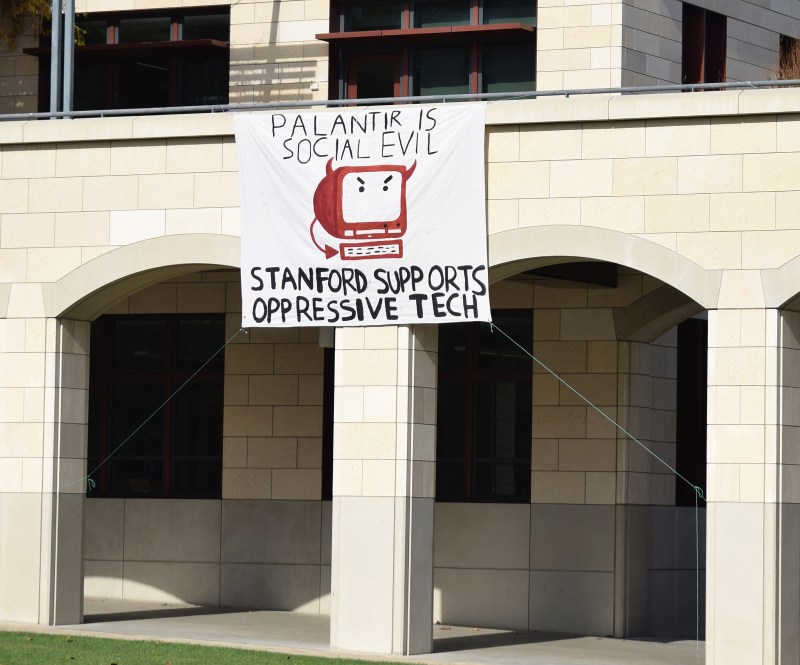Members of the campus activist group Students for the Liberation of All People (SLAP) lined up in front of Gates Computer Science Building Tuesday afternoon to protest Stanford’s involvement with Palantir, a Palo Alto-based data mining company criticized for its partnership with Immigration and Customs Enforcement (ICE).
“We are trying to use our position as Stanford students to hold these companies accountable for the tech that they build for ICE and border control,” said one member of SLAP, an undergraduate Symbolic Systems major who was requested anonymity out of concern for their safety.
Similar protests occurred at universities across the country as part of the Student Day of Action. Protests have seen success at universities like Duke, Brown and nearby UC Berkeley, which recently made efforts to cut their ties with Palantir. Students across the country have taken issue with Palantir’s involvement with ICE and border control. One of ICE’s largest raids saw the arrest of over 680 people at a food processing plant in Mississippi in August, and a report from immigration advocacy group Mijente suggests that Palantir technology was used to assist ICE in their raids.
Palantir, headquartered in Palo Alto, uses the Stanford campus as recruiting grounds, but its Stanford connections trace back to its inception — the billion-dollar company was founded by Stanford alumni Peter Thiel B.A. ’89 J.D. ’92, Stephen Cohen ’05, Joe Lonsdale ’03, Alex Karp J.D. ’92, as well as former PayPal engineer Nathan Gettings.
The Stanford Computer Science Forum, which facilitates collaboration between the computer science department and Silicon Valley companies, accepts at least $24,000 annually from Palantir. SLAP hoped its protest would encourage students to be more conscientious of the policies of the companies that are recruiting on campus.
The goal of the protest, SLAP members said, was to not only stop Stanford’s involvement with Palantir but also to educate fellow students and to open up a conversation within the computer science department at Stanford.
“When you’re taking a CS class, they only teach you how to build things, they don’t teach you who you’re building it for,” the anonymous SLAP student said, arguing that that while the computer science department is great at teaching students how to code, but it does not teach them the potential implications of what they create and the ethics involved in the matter.
The head of communications at Stanford Engineering, Michael Freedman, wrote in a statement to The Daily that ethics play an important role in the teaching of computer science and is a priority for faculty, specifically citing the Presidential Initiative on Ethics, Society and Technology.
“Many CS faculty are actively engaged in this area both within their research and in the classroom, and they collaborate closely with scholars from other fields and disciplines throughout the University,” Freedman said.
In a letter to the School of Engineering, SLAP called for an “open meeting” to discuss Stanford’s relationship with Palantir.
Despite not yet meeting with SLAP, the University noted that “Stanford Engineering faculty, administrators, students services officers and others meet with students and representatives of student groups frequently, and are always willing to do so in a manner appropriate to the situation.”
Additionally, as a way of being more proactive with the issue of ethics in computer science, the department “anticipates holding discussions around important issues related to ethics and technology, and will provide more information about their plans in the near future.”
“We’ve been able to talk to a lot of people about Palantir and that goes hand in hand with educating people and informing them,” they said.
Contact Nourya Cohen at nacohen ‘at’ stanford.edu.
